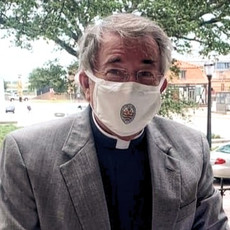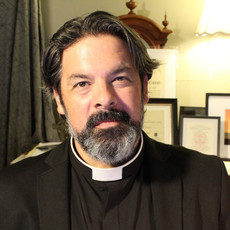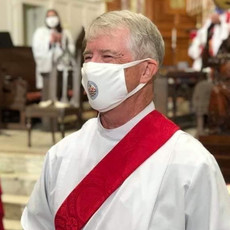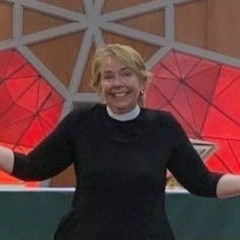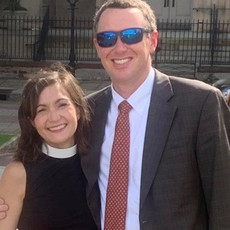First Graduates of the Diocesan School for Ministry Ordained
- Post
- Jul 8, 2020
- 7 min read
Updated: Jul 10, 2020
Author: The Rev. Albert Kennington, Registrar-Historiographer
The first graduates of the Diocesan School for Ministry were ordained deacons in Christ Church Cathedral, Mobile, on Sunday afternoon, June 28, 2020, at three o’clock. The Bishop of the Diocese, the Rt. Rev. J. Russell Kendrick, was celebrant. The Rev. Dr. Joy Blaylock, Dean of the School and Canon Missioner for Discipleship, was the preacher.
Ordinands and their sponsoring churches were Michael Eugene Lewis Ballard, St. Paul’s, Mobile; David Richard Chatel, St. Luke’s, Mobile; David Michael Clothier, Trinity, Mobile; Robert Mark Donnell, St. Paul's, Mobile; Rachel Shannon Iversen, Holy Cross, Pensacola; Lydia Knizley Johnson, St. Paul’s, Mobile; John Thomas Kendall, Christ, Pensacola; and John Keith Talbert, St. Paul’s, Foley.
Because of the COVID19 pandemic, attendance was limited to eight guests of each ordinand including their clerical and lay presenters and immediate families. All persons attending the service wore face coverings and were seated somewhat apart.
The ordinands completed a three-year course of study in the Diocesan School for Ministry begun in the fall of 2017 at St. Agatha’s, DeFuniak Springs. Iversen and Kendall were ordained to be the “vocational” or “permanent” deacons. Ballard, Chatel, Clothier, Donnell, Johnson, and Talbert were ordained to be “transitional” deacons who will continue their formation toward the priesthood. Beginning in August, the new deacons will serve for six months in congregations as assigned by the Bishop.
As much as our Diocesan School for Ministry is an exciting new and needed work in our diocese, it may seem to some as a departure from three years in residential seminaries as a norm. In fact, this school is but the latest in a long line of experiences forming women and men for ordained ministry outside the cloisters of our seminaries and without threat to their importance. The required course of study for deacons and priests are set forth in the Canons of the Episcopal Church. Regardless of the means of study and formation, the required proficiency is the same. A glimpse through Episcopal Church history in Alabama and Florida is informative.
In the diocesan convention of 2011 in St. James, Fairhope, Bishop Philip Duncan (our third bishop) ordained eight vocational deacons who had completed a 24-month diocesan program of classroom and off-site study. They are believed to be the first vocational deacons whose postulancy began in the Diocese of the Central Gulf Coast. In 2014, he ordained two more vocational deacons who had completed this program. This program of formation was designed by a planning group under the supervision of Bishop Duncan and the Commission on Ministry.
The Rev. Albert Pruitt was the first leader of this group; he was followed by the Rev. Thomas Heard. Fr. Pruitt recalls that in 2015, early in Bishop Kendrick’s episcopate, the bishop asked Fr. Pruitt to begin a review of diocesan-based programs across the country for the education and formation of deacons and priests. The Rev. Dr. Blaylock later joined Fr. Pruitt in this research. In 2016, Bishop Kendrick appointed a School of Ministry Development Committee of clergy and laity which critically examined other diocesan programs and envisioned a diocesan-based school for our diocese. In the 2017 diocesan convention, Fr. Pruitt presented a summary of the work done to date and presented plans for enrolling students/postulants by fall of that year.
Our second bishop (1981-2001), the Rt. Rev. Charles Duvall, ordained eight priests whose formation included either private study or one academic year in a residential seminary. He worked with the School of Theology (Sewanee) to provide this special year of study.
In 1977, Bishop George Murray, our first bishop, ordained Deaconess Evelyn Seymour to the priesthood in St. James, Fairhope; she was the first female priest in our diocese. She was a graduate, not of a seminary, but of the New York Training School for Deaconesses (a two-year program), who was ordained a deaconess in 1938 and served several ministries throughout the United States before retiring to Fairhope. Before 1970, she and her colleagues were called deaconesses. The 1970 General Convention officially recognized that deaconesses were real deacons.
During these same years (1970-1981), Bishop Murray introduced to the clergy of our diocese the Rev. John (Jack) Sheel, a retired Air Force officer in Fort Walton Beach who had been ordained as a “local priest” in the Diocese of Alaska under a canonical provision at the time which provided for ordaining members of usually isolated communities to be local priests to provide leadership in worship and administration of the sacraments in their own communities. There was an assumption that such priests were not to move from their home communities. Fr. Sheel moved to Fort Walton Beach, and he was a priest. The question was if he were to be licensed to function in our diocese. The question was a conundrum only Episcopal clergy and some lawyers could enjoy, but Bishop Murray licensed him, and he served faithfully in St. Simon’s-on-the-Sound and in our diocese. He was not a seminary graduate.
Before Bishop Murray’s time, and before our diocese was formed, there were two priests, among many, whose stories I recall. Neither the Rev. Howard Walker nor the Rev. George Merkel were seminary graduates, yet the fruits of their ministries live on.
Fr. Walker was born in Dallas County, Alabama, in 1852. By the account of his grandson and namesake, he was a country man who was attracted to the Episcopal Church. As was often done in time past, he “read for orders” with the rector of St. Paul’s, Selma, including the future third Bishop of Alabama, the Rt. Rev. Robert Barnwell. After his ordination and marriage, he made his home in Mobile, although he was mostly on the water and on the roads - such as they were. Beginning with St. Peter’s, Bon Secour, he preached and started missions up the eastern shore of Mobile Bay and into Baldwin and Escambia counties and further up into the Alabama delta. He acquired property around Weeks Bay, including the first acres of what is now Beckwith Camp and Conference Center. This he sold or gave to Bishop Charles Beckwith (the probate court records are not clear on the amount of the transaction).
Chicago native, Fr. George Merkel, was 52 when he moved from Stuttgart, Arkansas, to Atmore, in November of 1943, with his wife, daughter-in-law and grandson. World War II was in full throttle. No new cars were being made. Gasoline and tires were rationed. From his base in Trinity, Atmore, he served nine congregations – some on dirt roads: Andalusia, Bay Minette, Brewton, Evergreen, Greenville, the Little Rock community, two congregations in Poarch, and Atmore. Some of the churches were a hundred miles apart. He served faithfully until retiring in 1960, and then served as a supply priest as needed and able until his death in December of 1974.
A long time ago, Bishop Richard Hooker Wilmer, second Bishop of Alabama, established an order of deaconesses in 1864 to provide care for the children in the Church Home (called Wilmer Hall since 1948). This was 25 years before General Convention recognized deaconesses. These ordained women and their successors provided care for our children until the 1950s. Some, although not all, of these deaconesses were trained in the New York school; others were trained locally. None were seminary graduates.
In their last years, Deaconess Mary Redd and Deaconess Elmina Nehls were members of Trinity, Mobile, where they were both ordained in 1937. Deaconess Nehls, the last survivor of this order, died in 1988. She was buried from Trinity Church, Mobile, where I was rector. It was my honor to officiate at her funeral.
Further back, the first Bishop of Alabama, the Rt. Rev. Nicholas Hamner Cobbs, was born in 1795 in Bedford County, Virginia. He never attended a school of any kind. He was baptized as an infant and taught by his devout mother. As a young adult, he became a tutor in wealthy households where he had access to small but precious libraries. At age 29, having studied on his own the Bible, the Book of Common Prayer, and some books of theology, he rode his horse 90 miles to Stanton, Virginia, where he presented himself to the Bishop of Virginia, told his story, and was confirmed, ordained deacon, and then receive his first Holy Communion in the same service. He returned home and began two churches within two years. He later served in Charlottesville, Petersburg, and Cincinnati. He was consecrated Bishop of Alabama in 1844 and served in this pioneer ministry until his death in 1861. Among his many accomplishment, this man who had no diploma was one of the founders of The University of the South, Sewanee.
Throughout our history, most of our clergy have studied and graduated from our residential seminaries and been faithful, strong ministers of the Gospel. Throughout our history, the ministry of the Gospel in our diocese has been faithfully enriched by women and men whose vocational formation was by other paths. From all of them I am beneficiary.
Of the future of our Diocesan School for Ministry, Dean Joy Blaylock has this to say:
“We are now currently focused on the upcoming school year in September and transitioning our resources to teach primarily from the Diocesan Office (or by Zoom if such is warranted by the pandemic). It has long been a dream of mine and the Bishop’s to be able to expand the School for Ministry to include instructional training for lay licensed ministries. This coming year we will focus on three tracks for lay licensure: lay preacher, lay worship leader, and lay pastoral care leader. So far, the instructors for these courses will be the Rt. Rev. Russell Kendrick, the Rev. Dr. Joy Blaylock (myself), and the Reverend Deacon Clelia Garrity. The training for these tracks will consist of ten months of four hour training/teaching/fellowship on one Saturday a month.
“We also have two candidates who will begin the three-year program to become vocational deacons. I will be meeting and teaching those candidates along with Deacon Clelia Garrity and others yet to be determined.”
.png)




